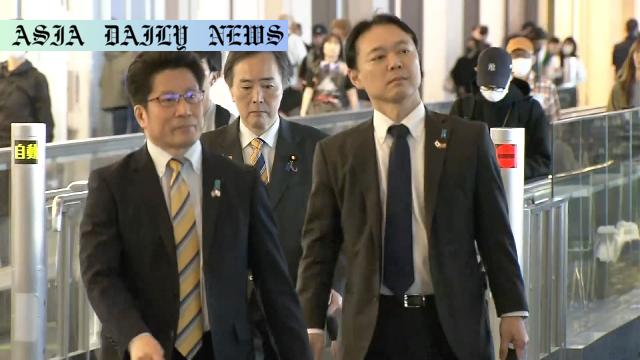Abductees: Japanese relatives meet US lawmakers to urge immediate actions for the return of abducted family members.
Japanese relatives of abductees visited Washington seeking US support.
They aim for swift efforts to return kidnapped family members.
Meetings with US lawmakers and officials were planned to highlight urgency.
Relatives emphasized an age-related time limit for reunions.

Japanese Abductees Families’ Mission to the US
Relatives of Japanese individuals abducted by North Korea decades ago are making a diligent effort to ensure their voices are heard on a global platform. With time as a critical factor, Yokota Takuya, younger brother of victim Yokota Megumi, and Iizuka Koichiro, whose mother was abducted when he was merely a year old, traveled to the US to engage with the Trump administration and influential lawmakers. Their shared mission is clear: prompt and decisive action to bring their loved ones back home.
The Japanese government acknowledges at least 17 citizens were abducted by North Korean agents in the 1970s and 1980s. Although a diplomatic breakthrough in 2002 allowed five of these individuals to return home, there are still 12 unaccounted-for victims. These families, facing emotional challenges and a race against time, seek not just strategies but tangible action to resolve this heart-rending issue. Since the average age of parents of the missing victims surpasses late eighties, every passing year poses a greater hurdle to achieving reunions.
The Role and Influence of US Leadership
Yokota and Iizuka’s prime focus during their visit is to meet senior US officials, including lawmakers in Congress, to emphasize the urgency of resolutions in conversations with North Korea. It is noteworthy that during his first term, former US President Donald Trump had raised the abduction issue face-to-face with North Korean leader Kim Jong Un. Drawing from this effort, the delegation hopes for continued US advocacy, asserting international influence on North Korea to act responsibly and ethically.
Such efforts are pivotal to maintain pressure on North Korea and, more importantly, to keep the narrative of abductees alive on the international stage. The families believe US support could significantly influence potential outcomes of future diplomatic summits and meetings involving Japan and North Korea. They are pushing not only for recognition but concrete steps—be it negotiations or joint statements affirming justice for victims.
The Personal Stories Behind the Advocacy
Behind these diplomatic moves are heart-wrenching personal stories that inspire determination and resilience. Yokota Takuya speaks on behalf of his sister, Megumi, who was abducted at just 13 years of age. The pain of not knowing her fate for decades continues to fuel his quest for justice. Iizuka, who lost the opportunity to know his mother due to her abduction, is similarly driven by an intense longing and hope that motivates his advocacy work.
Arimoto Akihiro, another family member whose daughter Keiko has not returned, recently passed away at 96 without seeing his loved one again. His death is a somber reminder of the cruel reality that time does not wait, and advocating sooner rather than later is essential. These stories underline the significance of urgency in addressing the abduction issue with the sincerity and speed that it deserves. Action is needed before their generation of parents and siblings is left with only memories.
Global Implications of the Abduction Issue
The North Korean abduction of Japanese nationals is not just a political issue or a bilateral dispute but a critical call for human rights justice that transcends geographical borders. It highlights the broader implications of international accountability and collective responsibility. Tackling this issue is essential not only for the abductees’ families but also to set a precedent of intolerance toward such violations of sovereignty and human dignity.
The Yokota and Iizuka families’ trip to the United States marks a chapter filled with a blend of hope and urgency. Their appeal to US policymakers serves as a reminder that the efforts to bring the 12 unaccounted-for North Korean abduction victims home are ongoing. With strategic alliances and an international sense of responsibility, their cry for justice can resonate far beyond Japan or Washington, potentially shaping history and offering closure to those yearning for it.
Commentary
Abductions in North Korean History: A Deeper Reflection
North Korea’s abduction of Japanese nationals is not only a historical injustice but serves as an emblem of the human rights violations that the regime has continually been accused of by international observers. What makes this issue profoundly tragic is how it bridges the gap between geopolitical tensions and personal anguish. Here, the political intersects with the unimaginable grief and determination of families who have been waiting decades for answers.
The Role of Persistence
The effort undertaken by Yokota Takuya, Iizuka Koichiro, and their families is nothing short of remarkable. Few can imagine the pain of losing loved ones under such circumstances. Meanwhile, even fewer have shown the resilience these families have demonstrated through years of tireless advocacy. Yokota’s message about the need for urgent action resonates because it acknowledges the ticking clock not just for the parents of these victims but for international attention to the abduction issues.
US Involvement: A Moral and Strategic Opportunity
The involvement of the United States in this matter is significant. While its relationship with North Korea remains complex and often tense, applying pressure in collaboration with allies like Japan on issues like abduction could yield results in the broader scope of regional stability. If nothing else, it would remind North Korea that its past actions are not exempt from scrutiny. These cases alone should encourage discussions about ethics, culpability, and geopolitical resolutions in East Asia.
Conclusion
Ultimately, the abduction issue represents an opportunity for nations to step forward in solidarity, reminding the world of the value of human lives. While the outcome remains uncertain, the ongoing advocacy of families is a testament to faith, resilience, and an unyielding commitment to justice. Their stories deserve to be heard, not only because of their personal pain but because they represent the struggle for accountability and respect for life across borders.


